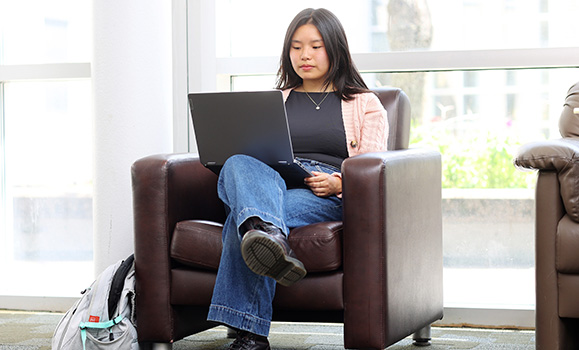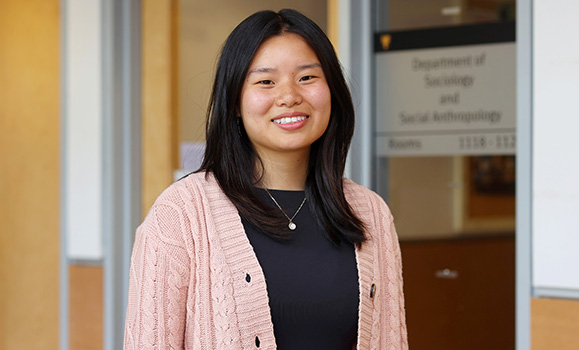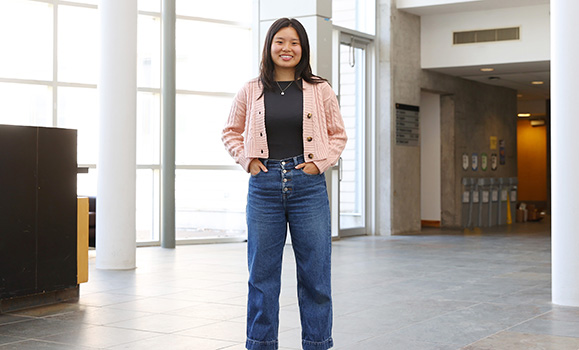This article is part of a series focusing on the grads of the Dalhousie Class of 2024. Spring Convocation runs from May 21 to 31 in Halifax and Truro. Read all our profilesĢżhere in one placeĢżas they are published, and for more information visit theĢżConvocation website.
Michelle Wang has lived her whole life in the small coastal community of Cow Bay, Nova Scotia. Born to Chinese parents who immigrated to Canada in the 1990s and growing up in a community with little cultural diversity, she often felt out of place.
āIāve always had a complicated relationship with my cultural or ethnic identity in the sense that I have never felt fully āChineseā nor fully āCanadianā,ā she explains.Ģż
These experiences shaped her worldviews and research. Going into university, she wasn't sure what she wanted to study, but knew she enjoyed writing and āwanted to help make the world a better place.ā This eventually led her to the Social Anthropology and International Development Studies programs at Dal, which she says drew her in ābecause of their exploratory yet critical natures.āĢż
This spring, Michelle graduates from Dalhousie with a Bachelor of Arts with Combined Honours in Social Anthropology and International Development Studies.
Food and sense of self
For her honours thesis, Michelle researched food and foodways in the cultural identities and experiences of second-generation Canadians.Ģż
āFood can mark group membership or exclusion, so I wanted to find out what foods were important to people, and what this said about their perceptions of self and their relationships to their various cultures,ā she explains.
Her hope was that the project could help uncover some of the everyday nuance of what it means to be a second-generation immigrant.Ģż
āI wanted to put peopleās experiences into a larger context of globalization and transnationalism ā in an era simultaneously characterized by āmulticulturalismā and white hegemony,ā she says.

Michelle says the multi-sensory nature of food and the hospitality of her research participants made her project a lot of fun. She collected her data through participant observation and semi-structured interviews, visiting the homes of second-generation immigrants (people who were born in Canada to immigrant parents) and 1.5-generation immigrants (people who immigrated when they were children) who lived in the Halifax area and asked them to share a meal with her that was meaningful to them.Ģż
āI got to know people who had backgrounds from Korea, Greece, Lebanon, and Pakistan (to name a few), and learned to make (and eat!) dishes ranging from chicken biryani to kimchi stew to stuffed peppers. Sharing meals with people from such wide-ranging ethnic backgrounds ā but who all had in common a love of food and grappling with coming from immigrant families ā was truly special.ā
Michelle found that food is heavily influential in cultural identity. For study participants, heritage foods ā the āethnicā foods participants ate at home growing up ā acted as sensory and material representations of belonging and difference to peers and family.Ģż Cooking and eating these heritage foods acted as connections to the people and places that arenāt physically near, but that hold significance to them.
āThis work is ultimately important to me because Iām hoping it helps build community in some capacity,ā she says. āThis might sound obvious, but sharing a meal with someone is really a great way to get to know them. And food has a special way of bringing people together and creating a shared sense of joy.āĢż
Michelle says conducting this research under the supervision of Drs. Martha Radice and Karen Foster of the Sociology and Social Anthropology department and being part of the honours cohort has really been the highlight of her time at Dalhousie.Ģż
āHaving the freedom to create your own project and learn about something you care deeply about is so meaningful!ā

A transformative experience abroad
Outside the classroom, Michelle has been involved with the Dalhousie/Kingās WUSC (World University Service of Canada) local committee as co-chair and this summer sheāll be traveling with WUSC to Jordan as part of a research cohort for the International Seminar.Ģż
Sheās also worked as a research assistant for Sociology prof Dr. Jonathan Amoyaw, mainly helping with a qualitative study about food insecurity among international students in Halifax, which they will be presenting on at the Canadian Sociological Association Conference this June.Ģż
Sheās been an executive member of the Dal SOSA society and a writer for the Dal/Kingās Chapter of Her Campus and for the Dalhousie Gazette. She also volunteered with the DSU Food Bank and has been part of a campaign called Dal Zero. She credits International Development Studies professor Dr. Kate Swanson and her classes for being incredibly influential on her academic and activist journeys.
In her third year, Michelle spent a semester abroad as an exchange student at the National University of Singapore. She took sociology courses while there and says it was fascinating to learn about power in a country with a very different cultural and political context to Canada. She says that going to Singapore was the best and most transformative experience of her life.
āIt was not only my first time living away from home, but it was also my first time living somewhere where I was part of the majority,ā she says, adding that part of the appeal of going to Singapore for her was to practice her Mandarin. āExperiencing life somewhere completely different ā yet in some ways familiar ā allowed me to better understand my own positionality. I also met many other Asian Americans and Asian Canadians on exchange and made lifelong friendships. It was my first time having Asian friends, and I had never realized how important that was to me until I could relate to these people on a level I had never experienced.ā
Now with a BA Combined Honours degree to her name, Michelleās future plans include getting a Master of Arts before eventually pursuing a PhD. But first, she plans to take a year off from formal studies to continue working in research and do some more traveling.Ģż
āGoing to university is a privilege that I try hard not to take for granted,ā she says. āI feel so grateful to have had such a positive experience at Dalhousie and for all the opportunities itās brought my way!āĢż
 Ģż
Ģż

